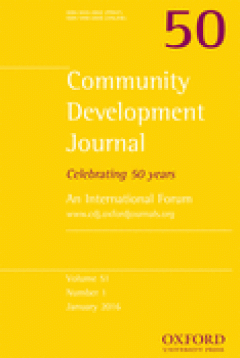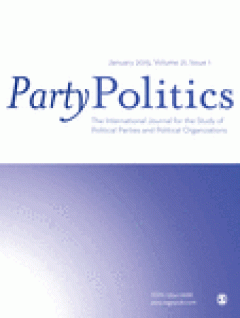Filter by

Mengapa harus KORUPSI
Mengapa harus korupsi? Ya, kalimat ini menjadi kata kunci bagi mereka untuk membatalkan niatnya melakukan korupsi, meskipun kesempatan melakukannya sangat terbuka luas, mengingat betapa besar kerugian yang pasti terjadi, baik kepada Bangsa dan Negara, termasuk diri dan keluarga sendiri. Keistimewaan dari tulisan ini adalah merupakan hasil dari perpaduan rujukan kitab suci al-Qur'an dan sunnah …
- Edition
- 1st print
- ISBN/ISSN
- 9789799533920
- Collation
- ii; p. 212; ill; 18 cm
- Series Title
- Serial Membangun Karakter Bangsa
- Call Number
- 364132 3 AKB m

Demokrasi dan perencanaan ekonomi
arik menarik antara kapitalisme dan sosialisme berlangsung di hampir semua negara. Baik negara kapitalis di Barat maupun negara statist di Timur tidak memberikan cara-cara yang bisa diterima dalam mengorganisir masyarakat. Negara kapitalis modern memang mampu memenangkan demokrasi politik, tetapi tidak dengan demokrasi ekonomi-nya. Di samping itu, kapitalisme modern tidak berjalan dalam modus …
- Edition
- 1st print
- ISBN/ISSN
- 9798120515
- Collation
- vii,286 p. ; 21 cm.
- Series Title
- -
- Call Number
- 321.8 DEV d

Local property ownership, municipal policy, and sustainable urban development…
Sustainable urban development is increasingly associated with locally controlled economies. While �localist� initiatives are usually addressed to energy, consumer goods, and capital, the efficacy of local property ownership for urban development outcomes is largely unexplored. This article investigates historical land ownership patterns in a downtown Phoenix, AZ, district ripe for infill proper…
- Edition
- Volume 50, Number 3 July 2015, pages 510-528
- ISBN/ISSN
- 0010-3802
- Collation
- -
- Series Title
- Community Development Journal
- Call Number
- -

Finance, social economics and community development
The last three decades have seen social enterprises in the United Kingdom pushed to the forefront of welfare delivery, workfare and area-based regeneration. For critics, this is repositioning the sector around a neoliberal politics that privileges marketization, state roll-back and disciplining community groups to become more self-reliant. Successive governments have developed bespoke products,…
- Edition
- Volume 50, Number 3 July 2015, pages 494-509
- ISBN/ISSN
- 0010-3802
- Collation
- -
- Series Title
- Community Development Journal
- Call Number
- -

Processes of community-led social enterprise development: learning from the r…
This article considers whether, and if so how, rural communities can be supported, through a facilitated process, to create social enterprises within the field of health and care. Using results from the thematic analysis of four community case studies involved in a facilitated action-research process, the article identifies community capabilities and entrepreneurial skills needed to create such…
- Edition
- Volume 50, Number 3 July 2015, pages 478-493
- ISBN/ISSN
- 0010-3802
- Collation
- -
- Series Title
- Community Development Journal
- Call Number
- -

Towards a model of university-aided technologically driven community development
Over the past couple of decades, African universities have been considered to possess the capacity needed to enhance the development of the continent and its residential communities. In spite of this consideration, Africa as a continent still lags behind the rest of the world in terms of the quality of its institutions and its ability to meet the needs of ordinary people who desire a better soc…
- Edition
- Volume 50, Number 3 July 2015, pages 463-477
- ISBN/ISSN
- 0010-3802
- Collation
- -
- Series Title
- Community Development Journal
- Call Number
- -

Development-induced displacement: impact on adivasi women of Odisha
In independent India, national development has been largely equated with economic growth and surplus. Most tribal people in India lead a hard, materially poor life. Multiple natural sources along with strong community ties make their life possible, even under difficult circumstances. Adivasis are by far the most vulnerable and marginalized socio-economic group in India; gaps in poverty, literac…
- Edition
- Volume 50, Number 3 July 2015, pages 448-462
- ISBN/ISSN
- 0010-3802
- Collation
- -
- Series Title
- Community Development Journal
- Call Number
- -

Missing from the picture? Migrant and Refugee Community Organizations' respon…
This article discusses the largely under-researched anti-poverty work of Migrant and Refugee Community Organizations (MRCOs) in Glasgow. The role of MRCOs as a source of social capital and critical coping and survival mechanism in exile has received notable attention since the introduction of dispersal policy in 1999. The practices outlined in this article contribute to this growing body of res…
- Edition
- Volume 50, Number 3 July 2015, pages 433-447
- ISBN/ISSN
- 0010-3802
- Collation
- -
- Series Title
- Community Development Journal
- Call Number
- -

The relational bent of community participation: the challenge social network …
The policy language of recent UK governments in relation to �activating� communities has drawn on images of �community� as coherent constructions � communities of place � recognizable to their members who are capable of concerted action. From this conceptual basis, localities identified as �ineffective� are encouraged to become �successful, integrated communities' through government action such…
- Edition
- Volume 50, Number 3 July 2015, pages 418-432
- ISBN/ISSN
- 0010-3802
- Collation
- -
- Series Title
- Community Development Journal
- Call Number
- -

The social and solidarity economy towards greater ‘sustainability’: learn…
This article provides a snapshot of social and solidarity economy (SSE) institutions and activities in two differing regions of the world in order to reflect on how the SSE is being conceptualized and practised in varying contexts and cultures. The SSE is a growing social movement that includes a range of activities that share common values, including solidarity and mutual support, with a focus…
- Edition
- Volume 50, Number 3 July 2015, pages 403-417
- ISBN/ISSN
- -
- Collation
- -
- Series Title
- Community Development Journal
- Call Number
- -

Does substance matter? A model of qualitative portfolio allocation and applic…
Gamson�s Law of office distribution tells us approximately how many ministries each member of a coalition will receive. However, the question of which ministries are allocated to which parties according to a more general party motivation remains largely open. In a model-theoretic investigation of portfolio allocation we focus on the characteristics of the distributional process concerning the q…
- Edition
- Volume 21, Number 3 May 2015, pages 481-492
- ISBN/ISSN
- 1354-0688
- Collation
- -
- Series Title
- Party Politics
- Call Number
- -

Is it always up to the leadership? European policy-making in the Labour Party…
This article analyzes and compares the politics of European policy-making within the British Labour Party, the Parti Socialiste (PS) and the Sozialdemokratische Partei Deutschlands (SPD) between 1997 and 2012. We know that party leaders have assumed much autonomy in the making of European policy, but, as with policy-making in any area, their autonomy is constrained and sometimes even questioned…
- Edition
- Volume 21, Number 3 May 2015, pages 470-480
- ISBN/ISSN
- 1354-0688
- Collation
- -
- Series Title
- Party Politics
- Call Number
- -

Measuring the electoral mobilization of ethnic parties: Towards comparable in…
Measurement of the electoral mobilization of ethnic parties has posed a considerable challenge to those performing comparative research on the political mobilization of ethnic groups. To address this issue, we propose indicators that estimate the electoral mobilization of ethnic parties by combining administrative and survey data. Specifically, we propose two measures: an absolute one, fully is…
- Edition
- Volume 21, Number 3 May 2015, pages 456-469
- ISBN/ISSN
- 1354-0688
- Collation
- -
- Series Title
- Party Politics
- Call Number
- -

Candidate campaigning in parliamentary systems: Individualized vs. localized …
The individualization of politics is usually studied in relation to party leaders. Using new data from the Norwegian Candidate Survey 2009 and in-depth interviews with 29 top candidates, in this article we study whether candidates in the Norwegian 2009 parliamentary election ran party-centred or individualized campaigns. We distinguish between the organizational aspects and the communicative fo…
- Edition
- Volume 21, Number 3 May 2015, pages 428-439
- ISBN/ISSN
- 1354-0688
- Collation
- -
- Series Title
- Party Politics
- Call Number
- -

Political sophistication in Central and Eastern Europe: How can parties help?
This article investigates how parties can influence the level of political sophistication their supporters have. Although the importance of parties in providing their supporters with political information was first suggested in early studies of voting behaviour, this level of analysis has been omitted from individual studies of political sophistication. Focusing on the political environment of …
- Edition
- Volume 21, Number 3 May 2015, pages 440-455
- ISBN/ISSN
- 1354-0688
- Collation
- -
- Series Title
- Party Politics
- Call Number
- -

Presidential coattails: A closer look
This article takes a closer look at how presidential elections affect the fragmentation of the legislative party system. It reviews the theory and conventional empirical modelling strategy; identifies some drawbacks to this strategy and suggests solutions; and then conducts an empirical investigation of the implications of this critique by combining replication data from Golder (2006) with new …
- Edition
- Volume 21, Number 3 May 2015, pages 417-427
- ISBN/ISSN
- 1354-0688
- Collation
- -
- Series Title
- Party Politics
- Call Number
- -

Do political parties matter for turnout? Number of parties, electoral rules a…
Does the number of political parties influence voter turnout in developing democracies? Some scholars argue that large party systems facilitate matching voter preferences with a specific party, increasing turnout. Others argue multiparty systems produce too many alternatives, decreasing turnout. In developing democracies, there is debate over whether these institutions matter at all. We argue t…
- Edition
- Volume 21, Number 3 May 2015, pages 404-416
- ISBN/ISSN
- 1354-0688
- Collation
- -
- Series Title
- Party Politics
- Call Number
- -

Alone or together? How institutions affect party entry in presidential electi…
Prior research has shown that institutions affect parties� incentives to coordinate within elections or compete on their own. However, no study to date has examined with institutional effects when parties coordinate in the most important of electoral contests: the presidential race. In this article, we explain which institutions encourage parties to run as part of pre-electoral coalitions (PECs…
- Edition
- Volume 21, Number 3 May 2015, pages 393-403
- ISBN/ISSN
- 1354-0688
- Collation
- -
- Series Title
- Party Politics
- Call Number
- -

Closed-list proportional representation in Russia The fates of former distri…
This work considers how a ruling party in an increasingly authoritarian regime utilizes legislative electoral system changes. It argues that the placement of former district deputies on the list of Russia�s ruling party after the move to a PR-only system reflected an interest in expanding its presence in the countryside as well as the attractiveness of the ruling party to the former district de…
- Edition
- Volume 21, Number 3 May 2015, pages 381-392
- ISBN/ISSN
- 1354-0688
- Collation
- -
- Series Title
- Party Politics
- Call Number
- -

Preference for radical right-wing populist parties among exclusive-nationalis…
The literature on authoritarianism and exclusive forms of nationalism often implies that authoritarian and exclusive-nationalist individuals will prefer radical right-wing populist parties such as Austria's FP�. The theoretical case for such implications appears sound as party programmes for radical right-wing populist parties invoke rhetoric that should appeal to individuals with either of the…
- Edition
- Volume 21, Number 3 May 2015, pages 367-380
- ISBN/ISSN
- 1354-0688
- Collation
- -
- Series Title
- Party Politics
- Call Number
- -
 Computer Science, Information & General Works
Computer Science, Information & General Works  Philosophy & Psychology
Philosophy & Psychology  Religion
Religion  Social Sciences
Social Sciences  Language
Language  Pure Science
Pure Science  Applied Sciences
Applied Sciences  Art & Recreation
Art & Recreation  Literature
Literature  History & Geography
History & Geography